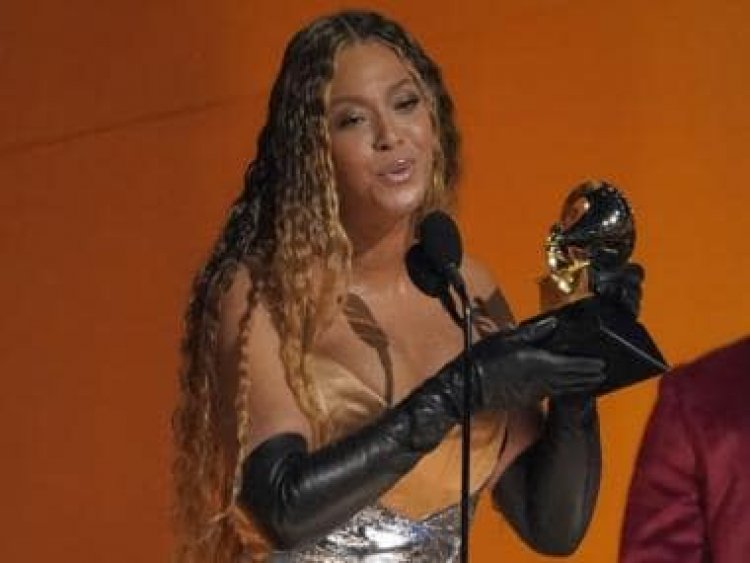Grammys 2023: Why did the gay community feature in Beyonce's record-breaking speech?
Grammys 2023: Why did the gay community feature in Beyonce's record-breaking speech?

Beyonce, or Queen B as her fans call her, was the Golden Girl at the Grammys. The popular singer set a record at the 65th Grammy awards for the most career wins by any artist (32 if anyone was asking), picking up four awards for her hit album Renaissance.
On the star-studded night, the 41-year-old singer, who arrived late after getting stuck in traffic, won for best R&B song, best dance/electronic recording, best dance/electronic album and best traditional R&B performance.
Walking up on stage in a metallic Gucci gown with cascading ruffles to accept her award for Best dance/electronic album, a visibly emotional Beyonce said, “I’d like to thank the queer community for your love and for inventing the genre,” to a thunderous applause, before she went on to thank her husband (rapper Jay-Z) and her “Uncle Jonny,” a gay relative whom she has described in the past as her “godmother” and as the person who exposed her to LGBTQ culture.
.@Beyonce made history tonight! #GRAMMYs pic.twitter.com/TvkTBDaMVB
— Recording Academy / GRAMMYs (@RecordingAcad) February 6, 2023
But what exactly is this genre? Did the LGBTQ community actually invent electronic music? We dive into music history to give you the answers.
What is dance/electronic music?
Today’s dance/electronic genre of music has actually been around since the 1970s. Back then, it was commonly known as disco and came from the French word ‘discotheque’ and meant a place in the 1960s where music was played.
Music buffs state that disco was created as a response to the “blues” music that was dominating the radio in America at that time. As a result, the music was more energetic and faster. Over the course of time, disco evolved into what it is today, but it remained more focused on speed and energy than any other aspects of the music.
With a heavy mix of bass, saxophones, four-beat kick drums and featured synthesisers, this music’s primary aim was to get people on dance floor. Soon artists jumped on the disco bandwagon and soon clubs across America were playing these sounds to thousands of youngsters.
In fact, singer Donna Summer’s 1977 song I Feel Love became the first well-known disco hit to have a completely synthesised backing track and till date remains one of the most popular disco songs that still get people grooving.
Then came the others — Boney M’s Daddy Cool, Stayin’ Alive by the Bee Gees, YMCA by the Village People and in India, Bappi Lahiri made the genre popular with his songs, Disco Dancer and Jimmy Jimmy, Aaja Aaja.
But what’s the link to the LGBTQ community?
But, is Beyonce right in saying that the lesbian, gay, bisexual, and transgender (LGBTQ) community invented the genre? While the Queen of Pop’s statement is not completely accurate, the history of dance music is unmistakably queer. It’s a well-known fact that disco — and House later on — got its start in queer nightlife.
The history of current electronic music, in particular, house music, can be traced back to the underground gay clubs of New York and Chicago. Legend has it that the genre was named after “The Warehouse” nightclub in Chicago’s South Side. Record stores in the city would attract listeners by playing mixes and dance records “as played at The Warehouse”. That was soon colloquially shortened to “house music”.
The nightclub The Warehouse first opened its doors in 1977 in Chicago. It initially operated as a members-only club almost exclusively frequented by Black and Latino gay men. At the time, gay bars and clubs were the only safe spaces for queer folks, away from police who terrorised the gay community.
One of the earliest big names from the genre was DJ Frankie Knuckles. Nicknamed the “Godfather of House”, Knuckles was also openly gay. Other early innovators included Larry Levan and DJ Ron Hardy, who too were gay and involved in the drag scene.
The popularity of the genre quickly spread across the world, inspiring a movement of dancing, acceptance and freedom.

Rise and fall of disco music
In the mid-70s, disco moved from the underground to the main stage. DJs across the world started playing disco music in the clubs and it moved from being the music of the gays to the music for all.
Record labels soon took notice of the rapid popularity of this underground genre. And this wasn’t just limited to the US. This genre of music spread internationally, becoming one of the most popular genres in Europe. The first major house success outside of the US is considered to be Love Can’t Turn Around by Farley “Jackmaster” Funk and Jesse Saunders, which peaked at ten on the UK charts in 1986. A year later, Jack Your Body by Steve “Silk” Hurley reached number one on the same charts becoming the first house record to do so.
Movies too jumped on to the scene; the hit 1977 film Saturday Night Fever starring John Travolta took heavy inspiration from this music.
However, the popularity of disco also became a cause for its falling popularity, along with opposition to disco from more conservative music listeners. When the AIDS epidemic hit the world in the ’80s, everything related to queer culture, including dance music and the nightlife, was labelled as bad and dangerous. Hence, disco saw a decline at the time.
There was also those who weren’t happy to see a style of music predominantly black and queer conquering the radios back then. One of them was Steve Dahl, a radio show host, who used his space to preach against disco and start the ‘Disco Sucks’ movement. This movement saw its peak on when thousands gathered at the White Sox stadium in Chicago on 12 July 1979 and chanted slogans of ‘disco sucks’. By the end of the night, the gathering had turned violent and 39 people had been arrested.
However, the disco movement saw a revival moment in the 2000s and has always influenced pop music. You can hear it in Madonna’s Hung Up in 2005 and Pharell’s Get Lucky in 2013.
In recent times, pop artists have taken to disco — there’s Dua Lipa with her 2020 album Future Nostalgia, Lady Gaga’s Chromatica in the same year and Beyonce with Renaissance in 2022.
With inputs from agencies
Read all the Latest News, Trending News, Cricket News, Bollywood News,
India News and Entertainment News here. Follow us on Facebook, Twitter and Instagram.
What's Your Reaction?



























































